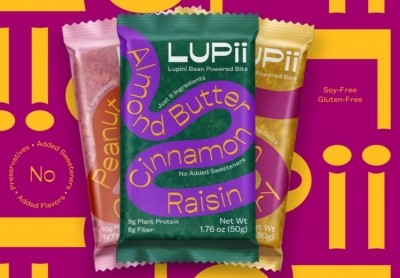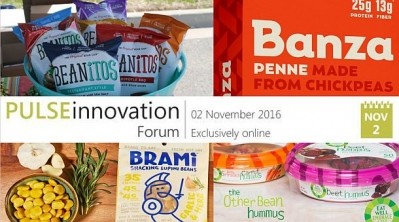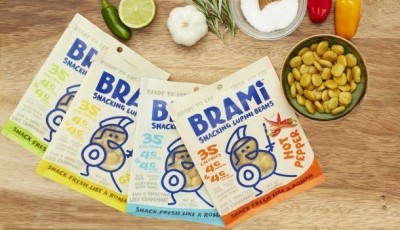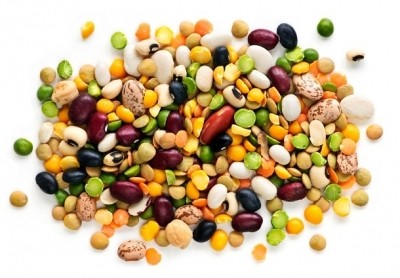Expo East
Protein-packed Brami beans go up against roasted chickpeas and edamame in the snack aisle
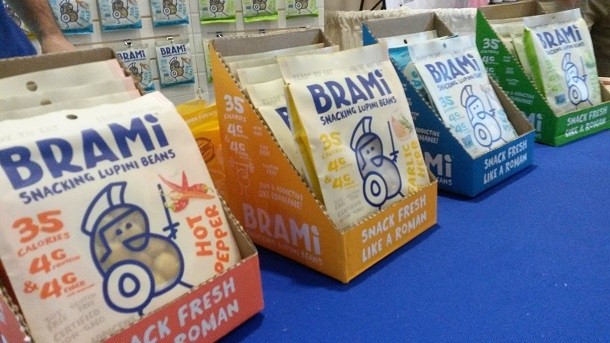
A common snack in Italy, the lupine is now hitting mainstream America thanks to a New York-based startup that launched the sprouted and lightly pickled beans in vacuum-packed, snack-sized bags in January.
Made with all-natural flavors, including Chili Lime, Hot Pepper, Garlic and Herb and Sea Salt, the beans are America’s “answer to that daily question what is going to satisfy me without ruining my diet or meal plan,” said Brami’s founder Aaron Gatti.
He explained that the beans are a perfect mid-day snack because their high fiber and protein content satisfy hunger pangs without blowing the calorie budget.
In particular, he noted at Natural Products Expo East in Baltimore that Brami’s lupini beans have the highest protein density per calorie of any plant with a notable 4 grams per 35 calories per ounce.
The beans’ high protein content not only checks an in-demand trend for many of today’s consumers, but it offers a “nutritional solution to a health problem by easing our over-reliance on animal proteins and all the resource issues that go with” animal protein production, Gatti said.
He also noted that the historical association of beans and plants as a lower-class source of protein compared to that from dairy and meat which traditionally were preferred by the middle and upper classes is shifting as the nutritional benefits of plant-based protein become more well known.
In addition to being high in protein, the beans also have 4 grams of fiber per ounce, which is almost the highest fiber content of any plant – falling just under that of collards and berries. This adds to the satiety of the snack and also helps offset some of the health problems associated with diets high in animal protein, including high cholesterol.
Gatti also noted that the snack is low in calories, with only about a fifth the amount of the average snack. Plus, he said, it has almost no fat and no carbs.
As if that weren’t enough to appeal to health-conscious snackers, Gatti also joked that with 2.5 times more essential minerals, excluding sodium, than coconut water, Brami lupini beans are “the only drink snack that will cure your hangover while you are drinking!”
Beyond its health claims, Brami’s lupini beans stand out from other pulse-based snacks available because they are not baked, fried or dried. Rather, they are blanched, lightly fermented in organic vinegar, lemon juice and natural ingredients and then vacuum packed for on-the-go eating.
Recognizing that texture is a key component for many snackers, Gatti was quick to note that even though Brami beans are not crunchy like chips, pretzels or roasted chickpeas, they also aren’t mushy. In fact, he says, they have a “satisfying pop” when you bite into them with your back teeth.
A long history as portable protein
While lupini beans may be new to many Americans, they have a rich history that helps connect them to the modern trend of eating ancient, nutrient dense foods, such as grains, heirloom seeds and produce.
“Lupini have this incredible ancient history. They were found in the tombs of the ancient Egyptians, meaning they wanted to take them with them to the afterlife. They also were part of the Roman diet, where they were known to be used as a portable protein for the soldiers on the campaign. So, we like to say that this is the bean that built the Roman Empire,” Gatti said.
He added: “Our innovation here is to take this ancient snacking bean and make it presentable to the modern consumer.”
Easy to eat, and easy to digest
While most Americans now understand the protein power of pulses and legumes, adoption to eating them has been slow in part because of the uncomfortable digestion issues that often accompany them. But, Gatti says, this isn’t a problem for lupini.
He explained that lupine have naturally lower levels of phytic acid, oligosaccharides, trypsin inhibitors, lectins and saponins, which are what make other legumes tough to digest – leading to bloating and discomfort.
In addition, he said, the extended sprouting process that Brami beans undergo to reduce their bitterness washes out any naturally occurring levels of these elements in the lupine beans “so they are incredibly easy on the digestion system.”
Expanding distribution
While Brami beans just launched in January, they already are available “in the four corners of the US” in Whole Foods stores in the Northeast, Southwest, Midwest and Northern California, Gatti said. The wide distribution is “only scratching the surface,” but is a promising indicator for growth especially considering how young the brand is.
With this in mind, Gatti said he will focus on expanding distribution in the near future as well as adding new flavors. He also is very much aware of the ever-shortening adoption and acquisition cycle for innovative young brands and says while he is “a very open person in general,” mergers and acquisitions “are the last thing on my mind right now because I am so focused on sharing this childhood passion of mine with as many people as possible.”
Aaron Gatti will be speaking in our FREE, online 60-minute Pulse Innovation Forum on November 2, featuring Brami, Beanitos (bean snacks), Eat Well Embrace Life ('other bean hummus'), Pulse Canada, and Banza (chickpea pasta).

